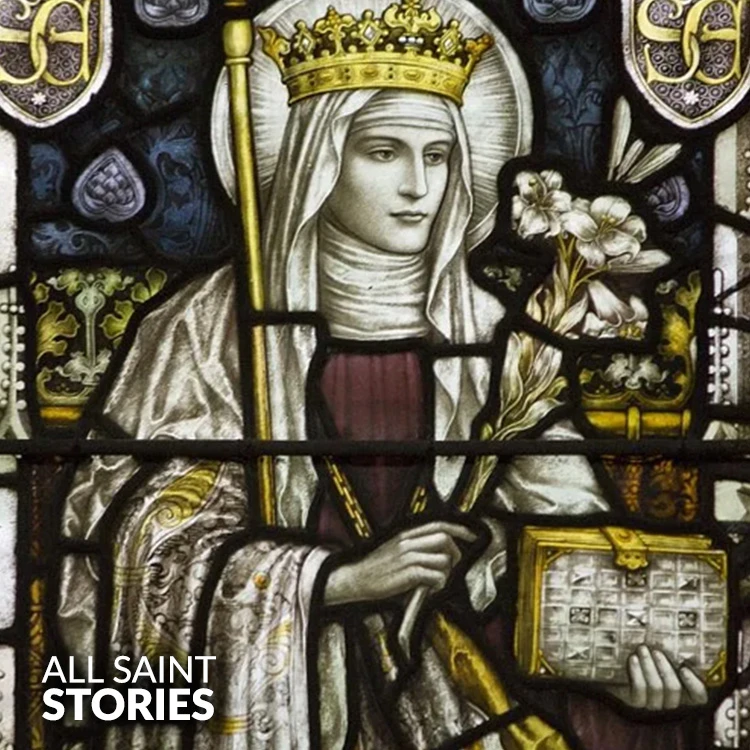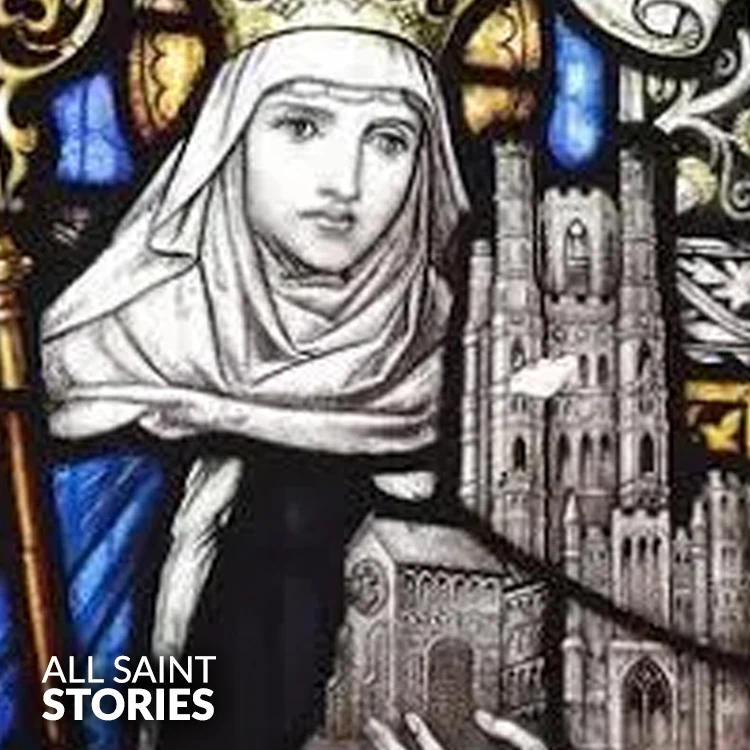O glorious St. Etheldreda, who from royal rank chose a life of purity and devotion, grant us the strength to remain steadfast in faith and to seek God's will in all we do. May your example inspire us to live humbly and serve others with joy. Amen.
ST. ETHELDREDA
ST. ETHELDREDA

St. Etheldreda, born around 630, was an Anglo-Saxon princess who became the founder and abbess of Ely. Known for her commitment to chastity and religious life despite royal marriages, she left a powerful legacy in English Christian tradition. Her feast day is celebrated on June 23.
t. Etheldreda, also known by her Saxon name Æthelthryth and later as St. Audrey, was born around the year 630 in East Anglia. She was the daughter of King Anna of East Anglia, a devout Christian royal who raised his children with strong religious values. From an early age, Etheldreda expressed a profound desire to live a life devoted to God and vowed to remain a virgin, a commitment she would honor despite the political demands placed upon her.
Her first marriage was to Tonbert, a nobleman from the South Gyrwas, who gave her the Isle of Ely as a dowry. Though the union was short-lived due to his death, Etheldreda maintained her vow of virginity during the marriage. After remaining a widow for five years, she was compelled to enter a second marriage with Egfrith, the future king of Northumbria. This marriage posed a significant challenge to her spiritual vows. However, Etheldreda was unwavering. She gained the support of St. Wilfrid, Bishop of York, who championed her cause and helped her secure permission to live separately and celibately from her husband.
Eventually, Etheldreda left the royal court and withdrew to the religious life she had long desired. In 673, she founded a double monastery at Ely, which would later become one of the most important religious centers in Anglo-Saxon England. As abbess, she gained a reputation for piety, asceticism, and leadership, fostering a devout community for both monks and nuns. Her deep spirituality and miracles attributed to her after death elevated her to sainthood.
Etheldreda died on June 23, 679, and her body was later found to be incorrupt, which was taken as a sign of holiness. Her legacy endured through the monastery, which eventually became Ely Cathedral, one of the great medieval English cathedrals. In London, St. Etheldreda’s Church in Ely Place, Holborn, dedicated to her, remains one of the oldest Catholic churches still in use. This church contains a relic of her hand and serves as a focal point for her veneration.
St. Etheldreda’s story has inspired countless Christians over the centuries. Despite her royal lineage and two political marriages, she remained steadfast in her faith, carving a path for women in religious leadership and sanctity. Her commitment to chastity, charity, and spiritual authority in a male-dominated era made her one of the most revered female saints of Anglo-Saxon England.
Video Not Found
The information on this website is compiled from various trusted sources. While we aim for accuracy, some details may be incomplete or contain discrepancies.
If you notice any errors or have additional information about this saint, please use the form on the left to share your suggestions. Your input helps us improve and maintain reliable content for everyone.
All submissions are reviewed carefully, and your personal details will remain confidential. Thank you for contributing to the accuracy and value of this resource.
Credits & Acknowledgments
- Anudina Visudhar (Malayalam) – Life of Saints for Everyday
by Msgr. Thomas Moothedan, M.A., D.D. - Saint Companions for Each Day
by A. J. M. Mausolfe & J. K. Mausolfe - US Catholic (Faith in Real Life) – Informational articles
- Wikipedia – General reference content and images
- Anastpaul.com – Saint images and reflections
- Pravachaka Sabdam (Malayalam) – Saint-related content and insights
We sincerely thank these authors and platforms for their valuable contributions. If we have unintentionally missed any attribution, please notify us, and we will make the correction promptly.
If you have any suggestion about ST. ETHELDREDA
Your suggestion will help improve the information about this saint. Your details will not be disclosed anywhere.
© 2026 Copyright @ www.allsaintstories.com



 English
English
 Italian
Italian
 French
French
 Spanish
Spanish
 Malayalam
Malayalam
 Russian
Russian
 Korean
Korean
 Sinhala
Sinhala
 Japanese
Japanese
 Arabic
Arabic
 Portuguese
Portuguese
 Bantu
Bantu
 Greek
Greek
 German
German
 Dutch
Dutch
 Filipino
Filipino